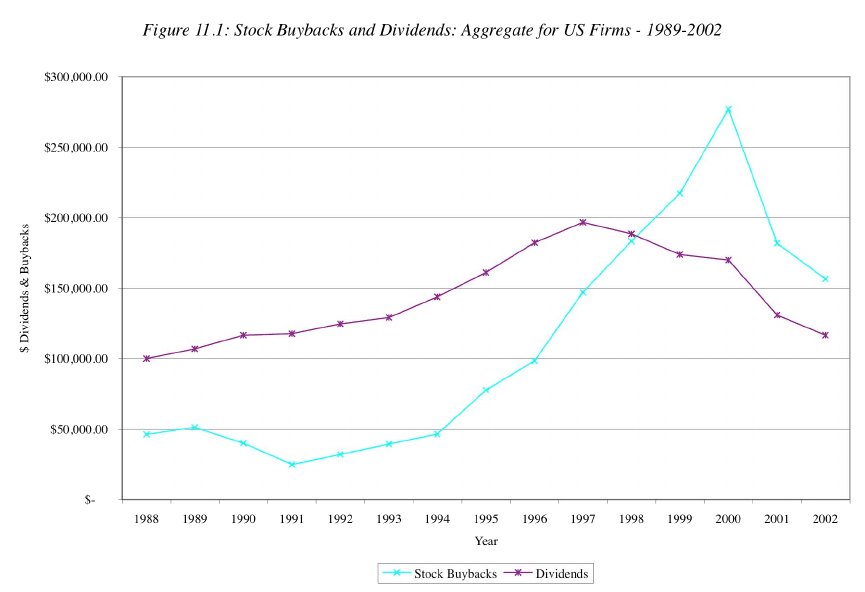Damodaran A. Applied corporate finance
Подождите немного. Документ загружается.


1
1
CHAPTER 11
ANALYZING CASH RETURNED TO STOCKHOLDERS
Companies return cash to stockholders in the form of dividends, but over the last
few years, they have also increasingly turned to stock buybacks as an alternative. Over
the last few years, how much have companies returned to their stockholders, and how
much could they have returned? As stockholders in these firms, would we want them to
change their policies and return more or less than they are doing currently? In this
chapter, we expand our definition of cash returned to stockholders to include stock buy
backs. As we will document, firms in the United States have turned increasingly to
buying back stock to either augment regular dividends, or, in some cases, to substitute for
cash dividends.
Using this expanded measure of actual cash flows returned to stockholders, we
consider two ways in which firms can analyze whether they are returning too little or too
much to stockholders. In the first, we examine how much cash is left over after
reinvestment needs have been met and debt payments made. We consider this cash flow
to be the cash available for return to stockholders and compare it to the actual amount
returned. We categorize firms into those that return more to stockholders than they have
available in this cash flow, firms that return what they have available and firms that
return less than they have available. We then examine the firms that consistently return
more or less cash than they have available, and the consequences of these policies. For
this part of the analysis, we bring in two factors – the quality of the firm’s investments
and the firm’s plans to change its financing mix. We argue that firms that return less to
their stockholders than they have available in free cash flows to equity are much more
likely to be trusted with the cash if they have a track record of good investments. Firms
that return more cash than they have available are on firm ground if they are trying to
increase their debt ratios.
In the second approach to analyzing dividend policy, we consider how much
comparable firms in the industry are paying as dividends. Many firms set their dividend
policies by looking at their peer groups. We discuss this practice, and suggest some
refinements in it to allow for the vast differences that often exist between firms in the
same sector.

2
2
In the last part of this chapter, we look at how firms that decide they are paying too
much or too little in dividends can change their dividend policies. Since firms tend to
attract stockholders who like their existing dividend policies, and because dividends
convey information to financial markets, changing dividends can have unintended and
negative consequences. We suggest ways in which firms can manage a transition from a
high dividend payout to a low dividend payout, or vice versa.
Cash Returned to Stockholders
In the last chapter, we considered the decision about how much to pay in
dividends and three schools of thought about whether dividend policy affected firm
value. Until the middle of the 1980s, dividends remained the primary mechanism for
firms to return cash to stockholders. Starting in that period, we have seen firms
increasingly turn to buying back their own stock, using either cash on hand or borrowed
money, as a mechanism for returning cash to their stockholders.
The Effects of Buying Back Stock
Let us first consider the effect of a stock buyback on the firm doing the buyback.
The stock buyback requires cash, just as a dividend would, and thus has the same effect
on the assets of the firm – a reduction in the cash balance. Just as a dividend reduces the
book value of the equity in the firm, a stock buyback reduces the book value of equity.
Thus, if a firm with a book value of equity of $ 1 billion buys back $ 400 million in
equity
1
, the book value of equity will drop to $ 600 million. Both a dividend payment and
a stock buyback reduce the overall market value of equity in the firm, but the way they
affect the market value is different. The dividend reduces the market price, on the ex-
dividend day and does not change the number of shares outstanding. A stock buyback
reduces the number of shares outstanding and is often accompanied by a stock price
increase. For instance, if a firm with 100 million shares outstanding trading at $ 10 per
share buys back 10 million shares, the number of shares will decline to 90 million, but the
1
The stock buyback is at market value. Thus, when the market value is significantly higher than the book
value of equity, a buyback of stock will reduce the book value of equity disproportionately. For example, if
the market value is five times the book value of equity, buying back 10% of the stock will reduce the book
value of equity by 50%.

3
3
stock price may increase to $ 10.50. The total market value of equity after the buyback
will be $ 945 million, a drop in value of 5.5%.
Unlike a dividend, which returns cash to all stockholders in a firm, a stock
buyback returns cash selectively to those stockholders who choose to sell their stock to
the firm. The remaining stockholders get no cash; they gain indirectly from the stock
buyback if the stock price increases. Stockholders in the firm described above will find
the value of their holdings increasing by 5%, after the stock buyback.
In Practice: How do you buy back stock?
The process of repurchasing equity will depend largely upon whether the firm
intends to repurchase stock in the open market, at the prevailing market price, or to make
a more formal tender offer for its shares. There are three widely used approaches to
buying back equity:
• Repurchase Tender Offers: In a repurchase tender offer, a firm specifies a price at
which it will buy back shares, the number of shares it intends to repurchase, and the
period of time for which it will keep the offer open, and invites stockholders to
submit their shares for the repurchase. In many cases, firms retain the flexibility to
withdraw the offer if an insufficient number of shares are submitted or to extend the
offer beyond the originally specified time period. This approach is used primarily for
large equity repurchases.
• Open Market Purchases: In the case of open market repurchases, firms buy shares in
the market at the prevailing market price. While firms do not have to disclose
publicly their intent to buy back shares in the market, they have to comply with SEC
requirements to prevent price manipulation or insider trading. Finally, open market
purchases can be spread out over much longer time periods than tender offers and are
much more widely used for smaller repurchases. In terms of flexibility, an open
market repurchase affords the firm much more freedom in deciding when to buy back
shares and how many shares to repurchase.
• Privately Negotiated Repurchases: In privately negotiated repurchases, firms buy
back shares from a large stockholder in the company at a negotiated price. This
method is not as widely used as the first two and may be employed by managers or
owners as a way of consolidating control and eliminating a troublesome stockholder.

4
4
The Magnitude of Stock Buybacks
In the last decade, more and more firms have used equity repurchases as an
alternative to paying dividends. Figure 11.1 summarizes dividends paid and equity
repurchases at U.S. corporations between 1989 and 2002.
Source: Compustat database (2003)
It is worth noting that while aggregate dividends at all US firms have grown at a rate of
about 1.18% a year over this 10-year period, stock buybacks have grown 9.83% a year. In
another interesting shift, the proportion of cash returned to stockholders in the form of
stock buybacks has climbed from 32% in 1989 to about 57% in 2002. Stock buybacks, in
the aggregate, exceeded dividends, in the aggregate, in 1999 for the first time in US
corporate history. While the slowdown in the economy resulted in both dividends and
stock buybacks decreasing in 2001 and 2002, buybacks still exceeded dividends in 2002.
This shift has been much less dramatic outside the United States. Firms in other
countries are far less likely to use stock buybacks to return cash to stockholders for a
number of reasons. First, dividends in the United States bear a much higher tax burden,
relative to capital gains, than dividends paid in other countries. Many European countries,

5
5
for instance, allow investors to claim a tax credit on dividends, for taxes paid by the firms
paying these dividends. Stock buybacks, therefore, provide a much greater tax benefit to
investors in the United States than they do to investors outside the United States, by
shifting income from dividends to capital gains. Second, stock buybacks are prohibited or
tightly constrained in many countries. Third, a strong reason for the increase in stock
buybacks in the United States has been pressure from stockholders on managers to pay
out idle cash. This pressure is far less in the weaker corporate governance systems that
exist outside the United States.
For the rest of this section, we will be using “dividend policy” to mean not just
what gets paid out in dividends but also the cash that is returned to stockholders in the
form of stock buybacks.
Illustration 11.1: Dividends and Stock Buybacks: Disney, Aracruz and Deutsche Bank
In the table that follows, we consider how much the Disney, Aracruz and
Deutsche Bank have returned to stockholders in dividends, and how much stock they
have bought back each year between 1994 and 2003.
Table 11.1: Cash Returned to Stockholders: Disney, Aracruz and Deutsche Bank (in
millions)
Disney
Aracruz
Deutsche Bank
Year
Dividends
(in $)
Equity
Repurchases
(in $)
Cash
to
Equity
Dividends
(in $)
Equity
Repurchases
(in $)
Cash
to
Equity
Dividends
(in Eu)
Equity
Repurchases
(in Eu)
Cash
to
Equity
1994
$153
$571
$724
$80
$0
$80
$400
$0
$400
1995
$180
$349
$529
$113
$0
$113
$459
$0
$459
1996
$271
$462
$733
$27
$0
$27
$460
$0
$460
1997
$342
$633
$975
$28
$0
$28
$489
$0
$489
1998
$412
$30
$442
$24
$26
$51
$600
$0
$600
1999
$0
$19
$19
$18
$0
$18
$707
$0
$707
2000
$434
$166
$600
$58
$23
$81
$801
$0
$801
2001
$438
$1,073
$1,511
$63
$0
$63
$808
$0
$808
2002
$428
$0
$428
$74
$2
$76
$808
$0
$808
2003
$429
$0
$429
$109
$3
$112
$808
$0
$808
All three companies paid dividends over the ten-year period but there are interesting
differences between the companies. Deutsche Bank has the steadiest dividend payment
record as the total dividend paid increased from 400 million euros in 1994 to 808 million
euros in 2003. Dividends were never cut during the entire period and have generally
6
6
grown, though the amount paid has remained unchanged from 2001 to 2003. Disney has
generally also increased its dividends over the ten-year period, with one naotable
exception. In 1999, Disney did not pay dividends as its operating performance turned
negative. Aracruz has had the most volatile history in terms of dividends paid, with
dividends rising in 5 of the 10 years examined and falling in 4 of the 10 years.
Looking at stock buybacks, Disney has been the most active player buying stock
in 8 out of the 10 years, with a buyback exceeding a billion dollars in 2001. Aracruz has
bought back relatively small amounts of stock over the same period, mostly has treasury
stock and Deutsche Bank has never bought back stock. These differences reflect the
markets that these firms operate in. As noted earlier, companies in the United States have
generally bought back more stock than their counterparts in other markets. Stock
buybacks are rare in Brazil and were not allowed in Germany for much of the ten year
period examined.
Reasons for Stock Buybacks
Firms that want to return substantial amounts of cash to their stockholders can
either pay a large special dividend or buy back stock. There are several advantages to
both the firm and its stockholders to using stock buybacks as an alternative to dividend
payments. There are four significant advantages to the firm:
• Unlike regular dividends, which typically commit the firm to continue payment in
future periods, equity repurchases are one-time returns of cash. Consequently, firms
with excess cash that are uncertain about their ability to continue generating these
cash flows in future periods should repurchase stocks rather than pay dividends.
(They could also choose to pay special dividends, since these do not commit the firm
to making similar payments in the future.)
• The decision to repurchase stock affords a firm much more flexibility to reverse itself
and to spread the repurchases over a longer period than does a decision to pay an
equivalent special dividend. In fact, there is substantial evidence that many firms that
announce ambitious stock repurchases do reverse themselves and do not carry the
plans through to completion.

7
7
• Equity repurchases may provide a way of increasing insider control in firms, since
they reduce the number of shares outstanding. If the insiders do not tender their
shares back, they will end up holding a larger proportion of the firm and,
consequently, having greater control.
• Finally, equity repurchases may provide firms with a way of supporting their stock
prices, when they are declining
2
. For instance, in the aftermath of the crash of 1987,
many firms initiated stock buyback plans to keep stock prices from falling further.
There are two potential benefits that stockholders might perceive in stock buybacks:
• Equity repurchases may offer tax advantages to stockholders, since dividends are
taxed at ordinary tax rates, while the price appreciation that results from equity
repurchases is taxed at capital gains rates. Furthermore, stockholders have the option
not to sell their shares back to the firm and therefore do not have to realize the capital
gains in the period of the equity repurchases.
• Equity repurchases are much more selective in terms of paying out cash only to those
stockholders who need it. This benefit flows from the voluntary nature of stock
buybacks: those who need the cash can tender their shares back to the firm, while
those who do not can continue to hold on to them.
In summary, equity repurchases allow firms to return cash to stockholders and still
maintain flexibility for future periods.
Intuitively, we would expect stock prices to increase when companies announce
that they will be buying back stock. Studies have looked at the effect on stock price of the
announcement that a firm plans to buy back stock. There is strong evidence that stock
prices increase in response. Lakonishok and Vermaelen examined a sample of 221
repurchase tender offers that occurred between 1962 and 1977, and at stock price changes
in the 15 days around the announcement.
3
Table 11.2 summarizes the fraction of shares
bought back in these tender offers and the change in stock price for two sub-periods:
1962-79 and 1980-86.
2
This will be true only if the price decline is not supported by a change in the fundamentals – drop in
earnings, declining growth etc. If the price drop is justified, a stock buyback program can, at best, provide
only temporary respite.
3
Lakonishok, J. and T. Vermaelen, 1990, Anomalous Price Behavior around Repurchase Tender Offers,
Journal of Finance, v45, 455-478

8
8
Table 11.2: Returns around Stock Repurchase Tender Offers
1962-1979
1980-1986
1962-1986
Number of
buybacks
131
90
221
Percentage of shares
purchased
15.45%
16.82%
16.41%
Abnormal return to
all stockholders
16.19%
11.52%
14.29%
On average, across the entire period, the announcement of a stock buyback increased
stock value by 14.29%.
In Practice: Equity Repurchase and the Dilution Illusion
Some equity repurchases are motivated by the desire to reduce the number of
shares outstanding and therefore increase the earnings per share. If we assume that the
firm’s price earnings ratio will remain unchanged, reducing the number of shares will
usually lead to a higher price. This provides a simple rationale for many companies
embarking on equity repurchases.
There is a problem with this reasoning, however. Although the reduction in the
number of shares might increase earnings per share, the increase is usually caused by
higher debt ratios and not by the stock buyback per se. In other words, a special dividend
of the same amount would have resulted in the same returns to stockholders.
Furthermore, the increase in debt ratios should increase the riskiness of the stock and
lower the price earnings ratio. Whether a stock buyback will increase or decrease the
price per share will depend on whether the firm is moving to its optimal debt ratio by
repurchasing stock, in which case the price will increase, or moving away from it, in
which case the price will drop.
To illustrate, assume that an all-equity financed firm in the specialty retailing
business, with 100 shares outstanding, has $100 in earnings after taxes and a market
value of $1,500. Assume that this firm borrows $300 and uses the proceeds to buy back
20 shares. As long as the after-tax interest expense on the borrowing is less than $ 20, this
firm will report higher earnings per share after the repurchase. If the firm’s tax rate is
50%, for instance, the effect on earnings per share is summarized in the table below for
two scenarios: one where the interest expense is $ 30 and one where the interest expense
is $ 55.

9
9
Effect of Stock Repurchase on Earnings per Share
After Repurchase
Before
Repurchase
Interest Expense = $ 30
Interest Expense = $ 55
EBIT
$ 200
$200
$ 200
- Interest
$ 0
$ 30
$ 55
= Taxable Inc.
$ 200
$ 170
$ 145
- Taxes
$ 100
$ 85
$ 72.50
= Net Income
$ 100
$ 85
$ 72.50
# Shares
100
80
80
EPS
$ 1.00
$ 1.125
$ 0.91
If we assume that the price earnings ratio remains at 15, the price per share will change in
proportion to the earnings per share. Realistically, however, we should expect to see a
drop in the price earnings ratio, as the increase in debt makes the equity in the firm
riskier. Whether the drop will be sufficient to offset or outweigh an increase in earnings
per share will depend upon whether the firm has excess debt capacity and whether, by
going to 20%, it is moving closer to its optimal debt ratio.
Choosing between Dividends and Equity Repurchases
Firms that plan to return cash to their stockholders can either pay them dividends
or buy back stock. How do they choose? The choice will depend upon the following
factors:
• Sustainability and Stability of Excess Cash Flow: Both equity repurchases and
increased dividends are triggered by a firm’s excess cash flows. If the excess cash
flows are temporary or unstable, firms should repurchase stock; if they are stable and
predictable, paying dividends provides a stronger signal of future project quality.
• Stockholder Tax Preferences: If stockholders are taxed at much higher rates on
dividends than capital gains, they will be better off if the firm repurchases stock. If,
on the other hand, stockholders prefer dividends, they will gain if the firm pays a
special dividend.
• Predictability of Future Investment Needs: Firms that are uncertain about the
magnitude of future investment opportunities should use equity repurchases as a way

10
10
of returning cash to stockholders. The flexibility that is gained will be useful, if they
need cash flows in a future period to accept an attractive new investment.
• Undervaluation of the Stock: For two reasons, an equity repurchase makes even more
sense when managers believe their stock to be undervalued. First, if the stock remains
undervalued, the remaining stockholders will benefit if managers buy back stock at
less than true value. The difference between the true value and the market price paid
on the buyback will be accrue to those stockholders who do not sell their stock back.
Second, the stock buyback may send a signal to financial markets that the stock is
undervalued, and the market may react accordingly, by pushing up the price.
• Management Compensation: Managers often receive options on the stock of the
companies that they manage. The prevalence and magnitude of such option-based
compensation can affect whether firms use dividends or buy back stock. The payment
of dividends reduces stock prices, while leaving the number of shares unchanged. The
buying back of stock reduces the number of shares, and the share price usually
increases on the buyback. Since options become less valuable as the stock price
decreases, and more valuable as the stock price increases, managers with significant
option positions may be more likely to buy back stock than pay dividends.
Bartov, Krinsky and Lee examined three of these determinants – undervaluation,
management compensation and institutional investor holdings (as a proxy for stockholder
tax preferences) – of whether firms buy back stock or pay dividends.
4
They looked at 150
firms announcing stock buyback programs between 1986 and 1992 and compared these
firms to other firms in their industries that chose to increase dividends instead. Table 11.3
reports on the characteristics of the two groups.
Table 11.3: Characteristics of Firms Buying Back Stock versus those Increasing
Dividends
Firms buying back stock
Firms increasing
dividends
Difference is significant
Book/Market
56.90%
51.70%
Yes
Options/shares
7.20%
6.30%
No
4
Bartov, E., I. Krinsky and J. Lee, 1998, Some Evidence on how Companies choose between Dividends
and Stock Repurchases, Journal of Applied Corporate Finance, v11, 89-96.
